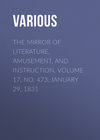Читать книгу: «The Mirror of Literature, Amusement, and Instruction. Volume 17, No. 473, January 29, 1831», страница 4
Deal.
R.A.
THE SELECTOR; AND LITERARY NOTICES OF NEW WORKS
PURSUIT OF KNOWLEDGE UNDER DIFFICULTIES
(Library of Entertaining Knowledge, vol. viii.)
The concluding portion of this volume has lately appeared, and is entitled to equal commendation with its predecessors. Among the most important of the anecdotical lives are, Roger Bacon, Herschel, Watt, and Arkwright—names nearly and dearly allied with the triumphs of science in this country. In Arkwright's Memoir are some important as well as interesting particulars of the Cotton Manufacture in England. Our quotation is, however, from another portion of the volume, illustrating, as we conceive it does, a species of character which can scarcely be estimated in too amiable a light.
The wonderful Robert Walker, as he is still called in the district of the country where he resided, was curate of Seathwaite in Cumberland during the greater part of last century. The fullest account that has appeared of Mr. Walker is that given, in the notes to his series of sonnets entitled "The River Duddon," by Mr. Wordsworth, in whose poem of the Excursion the worthy clergyman is also noticed with the commendations due to his singular virtues. From this memoir it appears that Walker was born in the parish of Seathwaite in 1709; that being of delicate constitution, it was determined by his parents, whose youngest child he was, to breed him a scholar; and that accordingly he was taught the elements of reading, writing, and arithmetic by the clergyman of the parish, who also officiated as schoolmaster. He afterwards contrived to acquire a knowledge of the classics; and, becoming in this manner qualified for taking holy orders, was ordained, and appointed to the curacy of his native parish, which was at this time (about the year 1735) of the value of five pounds per annum. On obtaining possession of this living Walker married, his wife bringing him what he calls himself, in one of his letters, "a fortune" of forty pounds. We must refer to Mr. Wordsworth's pages, and the documents which will be found printed there, for a detail of all that the industry and economy of the curate and his wife contrived to accomplish upon these scanty resources. Suffice it to say, that about twenty years after Walker's entrance upon his living we find its value, according to his own statement, increased only to the amount in all of seventeen pounds ten shillings. At a subsequent period it received a further augmentation, to what amount is not stated; but it was not considerable. Before this Mr. Walker had declined to accept the adjoining curacy of Ulpha, to be held, as proposed by the bishop, in conjunction with that of Seathwaite, considering, as he says himself, that the annexation "would be apt to cause a general discontent among the inhabitants of both places, by either thinking themselves slighted, being only served alternately, or neglected in the duty, or attributing it to covetousness in me; all which occasions of murmuring I would willingly avoid." Yet at this time he had a family of eight or nine children. One of his sons he afterwards maintained at the college of Dublin till he was ready for taking holy orders. He was, like his predecessors in the same cure, schoolmaster as well as clergyman of his parish; but "he made no charge," says his biographer, "for teaching school; such as could afford to pay gave him what they pleased." His hospitality to his parishoners every Sunday was literally without limitation; he kept a plentiful table for all who chose to come. Economical as he was, no act of his life was chargeable with any thing in the least degree savouring of avarice; on the contrary, many parts of his conduct displayed what in any station would have been deemed extraordinary disinterestedness and generosity. Finally, at his death, in 1802, he actually left behind him no less a sum than two thousand pounds.
There is in all this, as Mr. Wordsworth remarks, something so extraordinary, as to make some explanatory details necessary. These we shall give in his own words. "And to begin," says he, "with his industry; eight hours in each day, during five days in the week, and half of Saturday, except when the labours of husbandry were urgent, he was occupied in teaching. His seat was within the rails of the altar; the communion table was his desk; and, like Shenstone's schoolmistress, the master employed himself at the spinning-wheel, while the children were repeating their lessons by his side. Every evening, after school hours, if not more profitably engaged, he continued the same kind of labour, exchanging, for the benefit of exercise, the small wheel, at which he had sate, for the large one on which wool is spun, the spinner stepping to and fro. Thus was the wheel constantly in readiness to prevent the waste of a moment's time. Nor was his industry with the pen, when occasion called for it, less eager. Entrusted with extensive management of public and private affairs, he acted in his rustic neighbourhood as scrivener, writing out petitions, deeds of conveyance, wills, covenants, &c., with pecuniary gain to himself, and to the great benefit of his employers. These labours, at all times considerable, at one period of the year, viz., between Christmas and Candlemas, when money transactions are settled in this part of the country, were often so intense, that he passed great part of the night, and sometimes whole nights, at his desk. His garden, also, was tilled by his own hand; he had a right of pasturage upon the mountains for a few sheep and a couple of cows, which required his attendance; with this pastoral occupation he joined the labours of husbandry upon a small scale, renting two or three acres in addition to his own, less than one acre of glebe; and the humblest drudgery which the cultivation of these fields required was performed by himself. He also assisted his neighbours in haymaking and shearing their flocks, and in the performance of this latter service he was eminently dexterous. They, in their turn, complimented him with the present of a haycock, or a fleece; less as a recompense for this particular service than as a general acknowledgment. The Sabbath was in a strict sense kept holy; the Sunday evenings being devoted to reading the scripture and family prayer. The principal festivals appointed by the church were also duly observed; but through every other day in the week, through every week in the year, he was incessantly occupied in works of hand or mind; not allowing a moment for recreation, except upon a Sunday afternoon, when he indulged himself with a newspaper, or sometimes with a magazine. The frugality and temperance established in his house were as admirable as the industry. Nothing to which the name of luxury could be given was there known; in the latter part of his life, indeed, when tea had been brought into almost general use, it was provided for visiters, and for such of his own family as returned occasionally to his roof, and had been accustomed to this refreshment elsewhere; but neither he nor his wife ever partook of it. The raiment worn by his family was comely and decent, but as simple as their diet; the homespun materials were made up into apparel by their own hands. At the time of the decease of this thrifty pair, their cottage contained a large store of webs of woollen and linen cloth, woven from thread of their own spinning. And it is remarkable that the pew in the chapel in which the family used to sit, remained a few years ago neatly lined with woollen cloth, spun by the pastor's own hands. It is the only pew in the chapel so distinguished; and I know of no other instance of his conformity to the delicate accommodations of modern times. The fuel of the house, like that of their neighbours, consisted of peat, procured from the mosses by their own labour. The lights by which, in the winter evenings, their work was performed, were of their own manufacture, such as still continue to be used in these cottages; they are made of the pith of rushes dipped in fat. White candles, as tallow candles are here called, were reserved to honour the Christmas festivals, and were perhaps produced upon no other occasions. Once a month, during the proper season, a sheep was drawn from their small mountain flock, and killed for the use of the family; and a cow towards the close of the year, was salted and dried, for winter provision; the hide was tanned to furnish them with shoes. By these various resources this venerable clergyman reared a numerous family; not only preserving them, as he affectingly says, "from wanting the necessaries of life," but affording them an unstinted education, and the means of raising themselves in society."





















